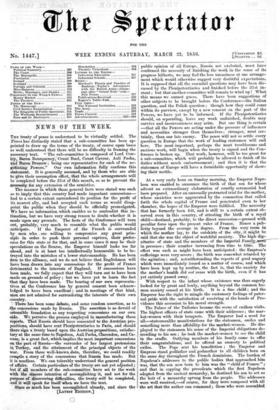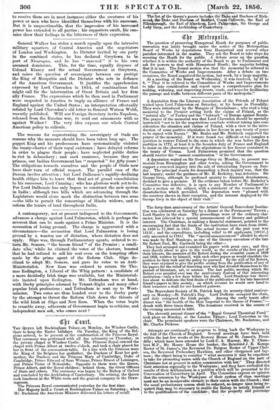At a very early hour on Sunday morning, the Emperor
Napo- leon was enabled to announce the birth of that son for whose advent an extraordinary elaboration of courtly ceremonial had been prepared. After an unusually protracted trial for the mother, whose anxieties were aggravated by the commotion that called forth the whole capital of France and penetrated even to her chamber, the hopes of the Emperor were fulfilled. The necessity that has formerly been felt, and is still to a certain extent ob- served even in this country, of attesting the birth of a royal child—destined, probably, to the direct succession—pressed with peculiar force upon the present ruler of France; Hence a pub- licity beyond the average in degree. From the very room in which the mother lay, to the outskirts of the eity,.it might be said that she was the object of watchful anxiety. The high.dig- nitaries of state and the members of the Imperial Family-weit-- in presence ; their number increasing from time to title. The effect was such as might have been anticipated : the Empress's sufferings were very severe ; the birth was somewhat retarded by the agitation ; and, notwithstanding the reports of good augury which were immediately issued as a matter of course, and which have been kept up by routine, the fact is, that the anxiety for the mother's health did not cease with the birth, even if it has yet entirely passed away.
With respect to the infant whose existence was thus eagerly looked for by great and lowly, anything beyond the common hu- man anxiety ceased at his birth. It is a fine , child ; and the Emperor has the right to mingle the customary feelings of pater- nal pride with the satisfaction of receiving at the hands of Pro- vidence this accession to his moral strength.
The Palace of the Tuileries became the scene of endless visits. The highest officers of state came with their addresses ; the mar- ket-women with their bouquets. The Emperor had a word for all--statesmanlike manifestations for the statesmen, smiles and
sometEing.more than affability-for the market-women. Hi dis-
played to the statesmen his sense of the Imperial obligations de- scending to his son ; he took the market-women to see the child in the cradle. Outlying members of his family came to offer their congratulations, and he offered an amnesty to political exiles. The Pope sent his benediction ; the Emperor and Empress stand godfather and godmother to all children born on the same day throughout the French dominions. The burden of Napoleon's addresses to the public bodies that approached him was, that the son now born to him was the " child of France " ; and that in copying the precedents which the first Napoleon adopted from the ancient monarchy, he destined his son to act as
the heir of a monarchy sprung from the people. The addresses were well received,--of course, for they were composed with all the art that the author can command ; those who were assembled
to receive them are in most instances either the creatures of his power or men who have identified themselves with his successes. But it is unquestionable, that the impression of his increased power has extended to all parties ; his supporters exult, his ene- mies show their feelings in the bitterness of their expresidon.



























